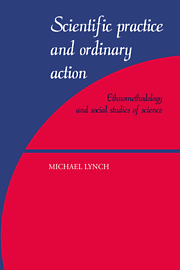Book contents
- Frontmatter
- Contents
- Acknowledgments
- Introduction
- 1 Ethnomethodology
- 2 The demise of the “old” sociology of science
- 3 The rise of the new sociology of scientific knowledge
- 4 Phenomenology and protoethnomethodology
- 5 Wittgenstein, rules, and epistemology's topics
- 6 Molecular sociology
- 7 From quiddity to haecceity: ethnomethodological studies of work
- Conclusion
- Name index
- Subject index
2 - The demise of the “old” sociology of science
Published online by Cambridge University Press: 03 December 2009
- Frontmatter
- Contents
- Acknowledgments
- Introduction
- 1 Ethnomethodology
- 2 The demise of the “old” sociology of science
- 3 The rise of the new sociology of scientific knowledge
- 4 Phenomenology and protoethnomethodology
- 5 Wittgenstein, rules, and epistemology's topics
- 6 Molecular sociology
- 7 From quiddity to haecceity: ethnomethodological studies of work
- Conclusion
- Name index
- Subject index
Summary
In the early 1970s, Barry Barnes, David Bloor, Michael Mulkay, David Edge, Harry Collins, and other British sociologists confronted the structural functionalist sociology of science developed by Robert Merton and his followers and assembled a loosely federated array of constructivist, relativist, and discourse-analytic programs. Since then, related variants of a “new” sociology of science proliferated on the Continent, in Australia, and in North America. Merton's program is still very prominent in American sociology, as his latter-day disciples have withstood the challenge of the new sociology of science by selectively assimilating some of the initiatives coming from Britain and the Continent.
Although proponents of the new sociology of science drew on a variety of sources, they were influenced by ethnomethodology's critical treatment of “constructive analysis” in the social sciences. Like ethnomethodologists they focused on informal day-to-day practices, but their constructivist interpretations mainly applied to the activities of natural scientists and not social scientists. In many cases the arguments and explanations generated by sociologists of scientific knowledge relied on scientistic versions of sociological method that ethnomethodologists had previously criticized. This apparent incongruity between a skeptical view of natural science theories, methods, and findings and a positive view of sociological analysis has not gone unnoticed by both critics and proponents of the new sociology of science, and it has recently become a focus of much consternation and debate. By reviewing and criticizing developments in the sociology of science in this and the next chapter, I attempt to clarify the problems that led to these debates.
- Type
- Chapter
- Information
- Scientific Practice and Ordinary ActionEthnomethodology and Social Studies of Science, pp. 39 - 70Publisher: Cambridge University PressPrint publication year: 1994

